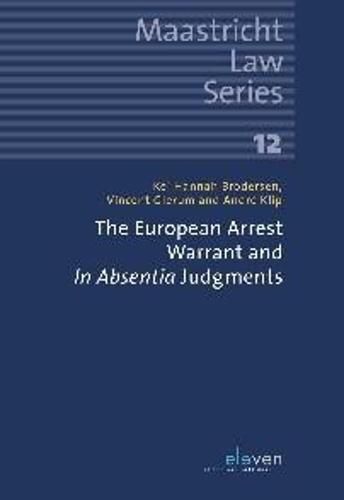Readings Newsletter
Become a Readings Member to make your shopping experience even easier.
Sign in or sign up for free!
You’re not far away from qualifying for FREE standard shipping within Australia
You’ve qualified for FREE standard shipping within Australia
The cart is loading…






This title is printed to order. This book may have been self-published. If so, we cannot guarantee the quality of the content. In the main most books will have gone through the editing process however some may not. We therefore suggest that you be aware of this before ordering this book. If in doubt check either the author or publisher’s details as we are unable to accept any returns unless they are faulty. Please contact us if you have any questions.
The absence of the accused in criminal proceedings leading to a conviction causes many legal and practical questions when an European Arrest Warrant is issued to execute such an in absentia judgment. Whereas some Member States see no problem in allowing trials without the accused, other Member States have serious objections to it. These different standards create many problems in practice and necessitate the executing judicial authority to request supplementary information from the issuing judicial authority, leading to delays and extra costs. It may result in - sometimes unjustified - refusals to execute the EAW. This study identifies the problems concerning the application of Article 4a(1) Framework Decision 2002/584 on in absentia judgments and proposes both practical and legislative solutions. It intends to contribute to a reduction of the number of in absentia cases, speeding up the surrender proceedings and raising the safeguards for the individual.
$9.00 standard shipping within Australia
FREE standard shipping within Australia for orders over $100.00
Express & International shipping calculated at checkout
This title is printed to order. This book may have been self-published. If so, we cannot guarantee the quality of the content. In the main most books will have gone through the editing process however some may not. We therefore suggest that you be aware of this before ordering this book. If in doubt check either the author or publisher’s details as we are unable to accept any returns unless they are faulty. Please contact us if you have any questions.
The absence of the accused in criminal proceedings leading to a conviction causes many legal and practical questions when an European Arrest Warrant is issued to execute such an in absentia judgment. Whereas some Member States see no problem in allowing trials without the accused, other Member States have serious objections to it. These different standards create many problems in practice and necessitate the executing judicial authority to request supplementary information from the issuing judicial authority, leading to delays and extra costs. It may result in - sometimes unjustified - refusals to execute the EAW. This study identifies the problems concerning the application of Article 4a(1) Framework Decision 2002/584 on in absentia judgments and proposes both practical and legislative solutions. It intends to contribute to a reduction of the number of in absentia cases, speeding up the surrender proceedings and raising the safeguards for the individual.